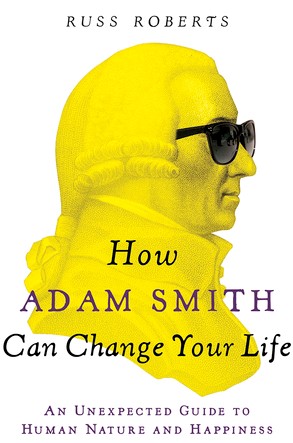This post is about a book which itself is about another book. How Adam Smith can change your life: An unexpected guide to human nature and happiness by Russ Roberts was one of the best reads during this lockdown period. The title of the book was really interesting as it closely resembled the title of a lovely book by Alain de Botton namely, How Proust can change your life. ( which was the inspiration for Russ Roberts in choosing this title as he acknowledges in the book ) I was really curious to know what the most celebrated economist in history can teach us about life in the 21st century. However, once I completed the book, I was sure that Russ Roberts, an economist himself, has introduced something awesome for all of us.
Philosophy of life from an economist
Adam Smith earned his place in the history of economics with his most famous book, “An enquiry into the nature and causes of the wealth of nations “which was published in 1776. This book laid the foundations of free-market capitalism as we know it today. Though Smith would not have known the way free-market capitalism changed our lives today, he correctly judged its potential in ensuring a better( not perfect anyway !) distribution of wealth and prosperity when guided by the market than the government. We are also familiar with another famous coinage in that book. ‘Invisible hand,’ a metaphor, introduced by Adam Smith which characterizes the mechanisms through which beneficial social and economic outcomes may arise from the accumulated self-interested actions of individuals. He wrote, “it is not from the benevolence of the butcher, the brewer, or the baker, that we expect our dinner, but from their regard to their own interest. We address ourselves, not to their humanity but to their self–love, and never talk to them of our own necessities but of their advantages”. However, Russ Roberts’s book is about his lesser-known work “The theory of moral sentiments “. It is very likely that even many economists would not have read this book. Russ Roberts himself admits that he did not read the book nor he has heard many people mention that for most of his career. He had to read it in connection with an interview and as he himself confesses, once he finished, he wanted to shout from rooftops that “ it’s a marvel, a hidden gem, you have got to read it.” Theory of moral sentiments explains where our morality comes from and why people can act with decency and virtue even when it conflicts with their self-interest. It’s a marvellous mix of psychology, philosophy and what we now call behavioural economics. The book is peppered with Smith’s observations on friendship, the pursuit of wealth, the pursuit of happiness and virtue. He discusses what is a good life and how to achieve it.
The impartial spectator
This is an idea which Smith discusses at the beginning of the book very elaborately. How do we choose a moral action? What makes us to do good? According to Smith, our behaviour is driven by an imaginary interaction with what he calls the impartial spectator –an impartial objective figure who sees the morality of our actions clearly. Even though selfishness motivates a number of our actions, mankind is generally altruistic. Even if none watches, we are not usually inclined to commit a crime. We are also eager to help somebody in distress. In Smith’s words, “How selfish soever man may be supposed, there are evidently some principles in his nature, which interest him in the fortune of others, and render their happiness necessary to him, though he derives nothing from it except the pleasure of seeing it.” Perhaps this impartial spectator sounds a lot like our conscience. However, in his formulation, the impartial spectator is a fellow human being who is looking over our shoulders and reminds us always about our smallness in this big universe. The impartial spectator reminds us that pursuing only self-interest is petty. Smith also arrives at the interesting conclusion that it is our love towards what is noble and honourable which prompt us to do good to others. In other words, imagining an impartial spectator help us to evaluate our actions objectively which in turn can make us better human beings.
To be loved and to be lovely
Adam Smith wrote “Man naturally desires, not only to be loved , but to be lovely. “ This is a very profound idea. Every human being would love to be praised, appreciated and desired and these intentions are very powerful in everyone. Now Smith links these two things. When you are a lovely person, you become eligible for love naturally. If you trace the motivation for a number of human actions you will arrive at the human desire for attention from others. A principal ingredient of human happiness is this appreciation from others. Another important aspect is that the attention or praise has to be real. For Smith, undeserved praise is a reprimand. We find a lot of sycophancy in the modern world and Smith is scathing in his attack on such an attitude. He says, “It is only the weakest and most superficial of mankind who can be much delighted with that praise which they themselves know to be altogether unmerited. A weak man may sometimes be pleased with it, but a wise man rejects it upon all occasions “. The point is that Smith wants us to face ourselves honestly. More than detecting false praise from others, we should be careful that we are not pretending to be more lovely than we actually are. Always remember that the hardest one to reject is our own praise.
Humility is a very important virtue for Adam Smith. He wrote, “Humility is an acquired taste. Once you come to like it, it’s a dish best served hot. It’s amazing how liberating it can be to say “I don’t know..”. It is only a simple truth that the more we know, the more we realise how much is there to know. As Smith tells emphatically, admitting ignorance can be a bliss.
Chasing wealth and fame
What are the things that motivate us? Is it wealth or fame or something else? Man in general likes wealth and fame. However, the point is, how much we are chasing these things and whether these are the only things that motivate us? Though a modest amount of both can bring happiness, according to Smith, a relentless pursuit of both can eat us up. He wrote, “ We have all the tools of contentment at hand already. You don’t have to conquer Italy to enjoy the fundamental pleasures of life. Stay human and subdue the rat within. Life’s not a race. It’s a journey to savour and enjoy. Ambition—the relentless desire for more—can eat you up.” The irony is that the world pays more attention to the rich and famous than wise and virtuous people. This is not to say that all rich and famous people lack wisdom and virtue. The message here is that a mindless chase after fame and wealth can ruin us. There will always be someone who is richer and famous than us. Smith in his book and with his life is telling us how to live. “Seek wisdom and virtue. Behave as if an impartial spectator is watching you. Use the idea of an impartial spectator to step outside yourself and see yourself as others see you. Use that vision to know yourself. Avoid the seductions of money and fame, for they will never satisfy.”
Living in the modern world
What is the best way to transform the world? Is it through our altruistic acts or charity or voluntary work? Of course, all these are important. However, the one thing which can make this world a better place is to do our duty at our workplaces honestly. When everyone does that, the world changes. This is a very important concern for Smith. Even if we feel that we make only an insignificant contribution, when everyone does it, it creates our morality and civilisation. It may not be up to us to finish the work but we can always start it. As Russ Roberts concludes, The theory of moral sentiments is a book about our personal space –how others view us and how we interact with them. It lays out some simple truths which can help us to live better lives and make this world a beautiful place. On the other hand, The wealth of nations is a book about our impersonal exchanges in a world of strangers.
How Adam Smith can change your life, is an excellent read. We will wonder how the ideas on morality and meaning of life proposed by an Economist, who lived more than two hundred years ago still resonate with our lives. As the author tells us, Economics helps us to understand that money is not the only thing that matters in life. Once we finish the book, we will realise how one of the wisest men who lived two centuries before could reach out to us and capture our attention and tell us one or two things about life and its meaning. Russ Roberts who makes Smith’s fabulous book alive for us captures all his favourite quotes also from ‘The theory of moral sentiments’, in this book. This is a book we should not miss. We are indebted to Russ Roberts for the best possible introduction to the wisdom of Adam Smith as revealed in “The theory of moral sentiments .”







4 Comments
Fr. Jijo Kandamkulathy
May 21, 2020 at 5:10 amRight. Economists have taught us a lot about morality. Marx was questioning the unequal distribution of the welath and the injusticve of the accumulation of wealth by some feeding on the hard work of others. Amartya Sen, in our own times spoke of the social responsibility in the economic distribution. Practical moral lessons come from quite unexpected disciplines!
Boby George
May 24, 2020 at 1:15 pmTrue. The comments on moral life from Adam Smith appears really illuminating.
Sr. Sheena George
May 23, 2020 at 6:33 amDear Boby,
With much interest, I read your book review. It was interesting to note that “the theory of moral sentiments explains where our morality comes from and why people can act with decency and virtue even when it conflicts with their self-interest.”
Your blog reminded me of another book that I read most recently called ” The Moral Imagination: The Art and Soul of Building Peace” by John Pual Lederach. Lederach speaks about the critical importance of developing a capacity to perceive things beyond and at a deeper level than what initially meets the eye.
Boby how well you pointed out that “Life’s not a race. It’s a journey to savor and enjoy. Ambition—the relentless desire for more—can eat you up.”
Boby George
May 24, 2020 at 1:17 pmThank you for reading and also for that book suggestion. Will take a look, if possible.